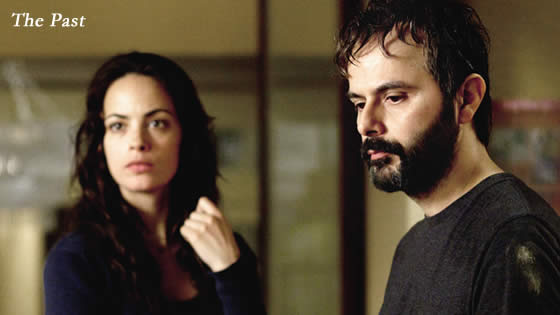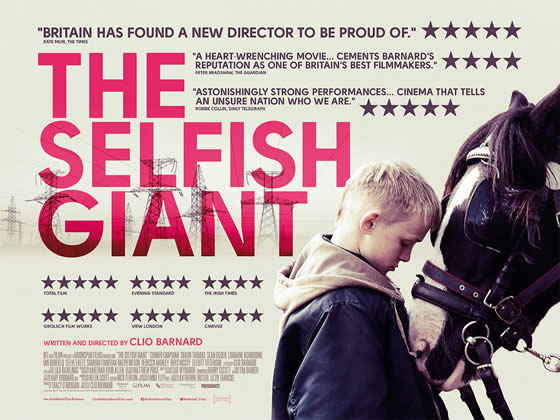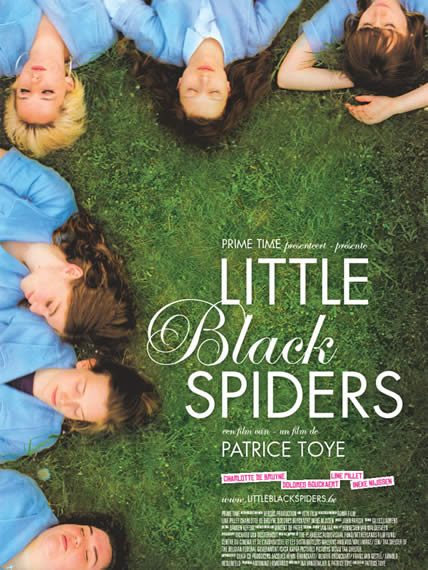 AFI FEST 2013 will run from November 7 to November 14. As in years passed, we had the opportunity to interview Jacqueline Lyanga, Festival Director, the American Film Institute’s (AFI) annual film festival in Los Angeles.
AFI FEST 2013 will run from November 7 to November 14. As in years passed, we had the opportunity to interview Jacqueline Lyanga, Festival Director, the American Film Institute’s (AFI) annual film festival in Los Angeles.
For Jacqueline Lyanga, it’s a position that she has held since 2010, but she has worked for AFI since 2005 as a programmer and producer of year-round and festival programs. Ms. Lyanga travels all over the world to most of the major international film festivals and markets to find films to showcase to AFI FEST’s Los Angeles audience. Prior to working for AFI FEST, Jacqueline worked for a number of other film organizations, including the Toronto International Film Festival, the Slamdance Film Festival and the Independent Film & Television Alliance (producers of the American Film Market). She has worked in film production and distribution for Triptych Media, October Films, and Polygram Filmed Entertainment, and has developed projects for film and television for the CBC, BET Pictures, Disney, Lifetime, Urban Entertainment and the Robey Theater Company.
Jacqueline holds a B.A. in Cinema Studies and Art History from the University of Toronto and an M.F.A from the American Film Institute.
Bijan Tehrani: Every year we have some changes and new things at AFI Fest, what should we expect to see this year?
Jacqueline Lyanga: Well one of the exciting new things this year is our Cinema’s Legacy program. Cinema’s Legacy is a section where we have an opportunity to showcase restorations of films with milestone anniversaries, or films that have a connection to our program in some way. This year, we are highlighting three films that have a strong connection to our program, one of them is “The Court Jester” which stars Danny Kaye. Danny Kaye was also in the original “The Secret Life of Walter Mitty”, the film based on the James Thurber short story, and we are showing the new version at the festival at one of our Galas on Wednesday, November 13th. “Mary Poppins” the much beloved film, will also be a part of Cinema’s Legacy. We are showing that because our opening night film is “Saving Mr. Banks”. That, of course, is about the story of Walt Disney convincing P.L. Travers to allow him to adapt her book into a musical, so there is no better way to experience Mary Poppins than after seeing that. I think it is great for a new generation to have an opportunity to see the film on the big screen. We will be showing it at the TCL Chinese Theatre on Saturday morning, so we are really excited about that. Another really special presentation is Jacques Demy’s musical, “The Umbrellas of Cherbourg”, and this year the artistic director Agnes Varda, her daughter Rosalie Varda Demy, and her son Matthew Demy restored the film. The film actually premiered at the Cannes Film Festival just this past May, so we will be showing the beautiful DDP restoration of it again at the TCL Chinese Theatre. So, we’ll have three just classic musicals that will be great to see and great to introduce a new audience to at the festival. 
BT: Our audience is very much interested in international cinema. How is the presence of international cinema at AFI Fest this year?
JL: Well, the presence of international cinema is very strong! We have films from 43 countries, which is quite extraordinary. We are showcasing 15 films that are Oscar Foreign Language submissions, and then we have films from a number of international film festivals that have won awards. We’ll have some strong films from countries regions around the world, including Romania, French-Canada, Mexico, Spain, South Korea, Palestine, and we also have three films from Iran; one of which is Asgar Farhadi’s new film. He has, of course, won the Academy Award for “A Separation”. We have another film from Jafar Panahi, “Closed Curtain”, who was actually at the festival in 2006 and he is currently under a 20 year ban from filmmaking in his country. Another film from an Iranian filmmaker who is under a 20 year ban is “Manuscripts Don’t Burn” by Mohammad Rasoulof. So, we are very excited to be able to show these films that showcase the work of artist who are working in spite of restrictions on their freedoms.
BT: Are there any guest from other countries that will be attending AFI Fest this year?
JL: There are! We are showing “Gloria”, which is a Chilean film that won a Silver Bear at the Berlinale for Paulina Garcia’s acting, and both Paulina Garcia and the Director of the film, Sebastián Lelio, will be coming to that. The directors of both “Bethlehem” (Yuval Adler) and “Omar” (Hany Abu-Assad) will be attending, as will Paolo Sorrentino, the director of “The Great Beauty”. Our guest Artistic Director from 2012, Bernado Bertolucci, will be at the festival presenting the 3-D version of “The Last Emperor” also at the TCL Chinese.
 We have a vast number of international directors present, including Clio Barnard (“The Selfish Giant”), Agustin Toscano and Esequil Radusky (“The Owners”), and filmmaker Samuel Kishi Leopo who directed WE ARE MARI PEPA, (in our new auteur section), and he is coming, as is Ralph Fiennes to introduce “The Invisible Woman” that is in our special screening section.
We have a vast number of international directors present, including Clio Barnard (“The Selfish Giant”), Agustin Toscano and Esequil Radusky (“The Owners”), and filmmaker Samuel Kishi Leopo who directed WE ARE MARI PEPA, (in our new auteur section), and he is coming, as is Ralph Fiennes to introduce “The Invisible Woman” that is in our special screening section.
For our screening of “Mandela: Long Walk to Freedom”, Director Justin Chadwick is coming along with stars Idris Elba and Naomi Harris.
BT: How can audiences meet these artists? Are there press conferences or Q&A’s?
JL: Yes, we will have Q&A’s. For example, Japanese director Hirokazu Kore-eda, who directed “Like Father Like Son”, which won a jury prize at Cannes, will be coming in and he will be attending for his screening and will be available for Q&A at the festival. Typically, the directors will come and they will do an introduction, and after the screening they will return for a Q&A with the audience.
BT: Also are there any events besides screenings; seminars, gatherings and all that?
JL: Well, we do have some presentations and conversations, but we have a very international Midnight section for film lovers who enjoy genre films. We have some really great films from Japan, Israel, from Belgium: “Big Bad Wolves”, “R100”, and “The Strange Color of Your Body’s Tears”. Also in our breakthrough section is another great  draw, which is the section where we pull films from our film submissions. These are works from filmmakers who took a chance and submitted a film to us, and a lot of our film program is curated from festivals that we travel to— Berlin, Cannes, Rotterdam, Toronto, Telluride, and more! We find films from filmmakers we have never heard of and it is really exciting to discover these films. In this section we have a film from Nigeria, “B for Boy”; a film from Belgium, “Little Black Spiders”; and a director based in Denmark who made a documentary called “My Afghanistan: Life in The Forbidden Zone”. He is a Danish journalist and filmmaker named Nagieb Khaja, and he gives civilians high definition cell phone cameras and allows them to take footage of first person experiences in Afghanistan. So that section provides a really diverse and interesting collection as well. We really strive to reflect the international nature of filmmaking today, so this is a part of our idea of what Hollywood is now. The festival really strives to redefine that and to look at the way in which international filmmakers have influenced each other, and that is one of the main reasons we have our artistic director.
draw, which is the section where we pull films from our film submissions. These are works from filmmakers who took a chance and submitted a film to us, and a lot of our film program is curated from festivals that we travel to— Berlin, Cannes, Rotterdam, Toronto, Telluride, and more! We find films from filmmakers we have never heard of and it is really exciting to discover these films. In this section we have a film from Nigeria, “B for Boy”; a film from Belgium, “Little Black Spiders”; and a director based in Denmark who made a documentary called “My Afghanistan: Life in The Forbidden Zone”. He is a Danish journalist and filmmaker named Nagieb Khaja, and he gives civilians high definition cell phone cameras and allows them to take footage of first person experiences in Afghanistan. So that section provides a really diverse and interesting collection as well. We really strive to reflect the international nature of filmmaking today, so this is a part of our idea of what Hollywood is now. The festival really strives to redefine that and to look at the way in which international filmmakers have influenced each other, and that is one of the main reasons we have our artistic director.
BT: How can audiences get to see these movies?
JL: Tickets are available for free, which really gives Los Angeles film fans—and anyone who can get to Los Angeles for those eight days—an opportunity to get to see great world cinema and some of the dialogue that is going on around the world. They can visit the website at AFI.com to get all of the information. Potential attendees can even select specific screenings. We have a registration system available so users can register to get time slots to buy tickets. After that period ends, they can just keep coming to the website to get tickets. Another way to do it, if you really want express access, is to purchase a Patron Package and become a Patron of the festival, and that will give you priority access both to regular screenings and to Gala’s. For someone who just wants to experience the best of world cinema, I would recommend a Cinepass Express, which doesn’t include Gala’s but it is an express pass for a lot of the films I have talked about—Really, some of the best films in the world!

